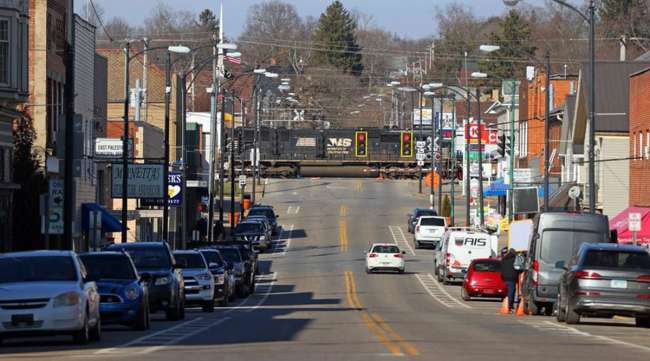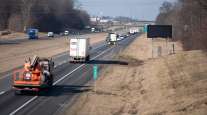cleveland.com
Railroads Challenging New Ohio Minimum Staffing Law

[Stay on top of transportation news: Get TTNews in your inbox.]
COLUMBUS, Ohio — A federal judge could soon rule on an industry challenge of a state railroad safety law passed in the wake of the East Palestine, Ohio, derailment that caused a massive release of hazardous chemicals.
Ohio lawmakers in March passed the state transportation budget, which included a new rule requiring that all freight railroads in most circumstances keep a crew of at least two members. The Association of American Railroads said that federal law alone controls the issue and states have no right to impose their own more stringent rules.
The dispute stems from the Feb. 3, 2023, derailment of 38 Norfolk Southern railcars in the small, Columbiana County town. Five of those cars carried 116,000 gallons of vinyl chloride, a toxic chemical used in the PVC plastics manufacturing process, causing a massive and ongoing mess and mitigation effort. The company has said three employees staffed the train that night.
The railroads attacked Ohio’s two-person crew requirement on constitutional grounds: They say federal law pre-empts states from acting. They also argue there’s no data to suggest one-person crews are less safe than more amply staffed trains.
Both sides have filed motions for summary judgment, which would allow U.S. District Judge Michael Watson to rule on the case in lieu of a full trial.
Attorney General Dave Yost’s office is defending the law on two basic grounds. For one, he argues that pre-emption doesn’t apply because there’s no conflict between the new state law and the various federal laws that regulate railroads.
How does hydrogen fuel cell technology fit into freight transportation? Find out with Parker Meeks, the CEO of Hyzon, a company that designs and manufactures fuel cell technology for heavy-duty transport applications. Tune in above or by going to RoadSigns.ttnews.com.
He also argues that a legal principle of “equal sovereignty” limits the ability of Congress to apply railroad laws that subject states to different burdens without good reason. The 5,000 rail miles in Ohio, he notes, are the fifth most of any state in the nation.
This argument prompted the attention of the U.S. Department of Justice, which weighed in as an interested party. The DOJ didn’t make any arguments about Ohio’s law but argued that the court should at least resolve the pre-emption issue before reaching any constitutionality ruling on the Regional Rail Reorganization Act.
Beyond the immediate legal question, the lawsuit shows how an industry can mount a legal and political fight against regulations even as one of its key players admits fault for a major incident. A federal proposal, the Railway Safety Act, would among other provisions mandate two-person crews for all freight trains, which would likely resolve the state-federal pre-emption issue. The legislation has failed to pass the U.S. Senate, where Norfolk Southern has opposed the bill. A similar bill, also stalled in the U.S. House of Representatives, does not require two-person crews.
Want more news? Listen to today's daily briefing below or go here for more info:
Distributed by Tribune Content Agency, LLC





